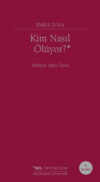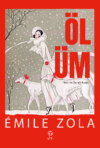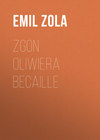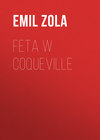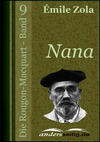Kitabı oku: «His Masterpiece», sayfa 2
But suddenly a shiver rippled over the girl’s satiny skin. Perhaps she had felt the weight of that gaze thus mentally dissecting her. She opened her eyes very wide and uttered a cry.
‘Ah! great heavens!’
Sudden terror paralysed her at the sight of that strange room, and that young man crouching in his shirt-sleeves in front of her and devouring her with his eyes. Flushing hotly, she impulsively pulled up the counterpane.
‘Well, what’s the matter?’ cried Claude, angrily, his crayon suspended in mid-air; ‘what wasp has stung you now?’
He, whose knowledge of womankind was largely limited to professional models, was at a loss to understand the girl’s action.
She neither spoke nor stirred, but remained with the counterpane tightly wrapped round her throat, her body almost doubled up, and scarcely showing an outline beneath her coverings.
‘I won’t eat you, will I?’ urged Claude. ‘Come, just lie as you were, there’s a good girl.’
Again she blushed to her very ears. At last she stammered, ‘Oh, no, monsieur, no – pray!’
But he began to lose his temper altogether. One of the angry fits to which he was subject was coming upon him. He thought her obstinacy stupid. And as in response to his urgent requests she only began to sob, he quite lost his head in despair before his sketch, thinking that he would never be able to finish it, and would thus lose a capital study for his picture.
‘Well, you won’t, eh? But it’s idiotic. What do you take me for? Have I annoyed you at all? You know I haven’t. Besides, listen, it is very unkind of you to refuse me this service, because, after all, I sheltered you – I gave up my bed to you.’
She only continued to cry, with her head buried in the pillow.
‘I assure you that I am very much in want of this sketch, else I wouldn’t worry you.’
He grew surprised at the girl’s abundant tears, and ashamed at having been so rough with her, so he held his tongue at last, feeling embarrassed, and wishing too that she might have time to recover a bit. Then he began again, in a very gentle tone:
‘Well, as it annoys you, let’s say no more about it. But if you only knew. I’ve got a figure in my picture yonder which doesn’t make head-way at all, and you were just in the very note. As for me, when it’s a question of painting, I’d kill father and mother, you know. Well, you’ll excuse me, won’t you? And if you’d like me to be very nice, you’d just give me a few minutes more. No, no; keep quiet as you are; I only want the head – nothing but the head. If I could finish that, it would be all right. Really now, be kind; put your arm as it was before, and I shall be very grateful to you – grateful all my life long.’
It was he who was entreating now, pitifully waving his crayon amid the emotion of his artistic craving. Besides, he had not stirred, but remained crouching on his low chair, at a distance from the bed. At last she risked the ordeal, and uncovered her tranquillised face. What else could she do? She was at his mercy, and he looked so wretchedly unhappy.
Nevertheless, she still hesitated, she felt some last scruples. But eventually, without saying a word, she slowly brought her bare arm from beneath the coverings, and again slipped it under her head, taking care, however, to keep the counterpane tightly round her throat.
‘Ah! how kind you are! I’ll make haste, you will be free in a minute.’
He bent over his drawing, and only looked at her now and then with the glance of a painter who simply regards the woman before him as a model. At first she became pink again; the consciousness that she was showing her bare arm – which she would have shown in a ball-room without thinking at all about it – filled her with confusion. Nevertheless, the young man seemed so reasonable that she became reassured. The blush left her cheeks, and her lips parted in a vague confiding smile. And from between her half-opened eyelids she began to study him. How he had frightened her the previous night with his thick brown beard, his large head, and his impulsive gestures. And yet he was not ugly; she even detected great tenderness in the depths of his brown eyes, while his nose altogether surprised her. It was a finely-cut woman’s nose, almost lost amidst the bristling hair on his lips. He shook slightly with a nervous anxiety which made his crayon seem a living thing in his slender hand, and which touched her though she knew not why. She felt sure he was not bad-natured, his rough, surly ways arose from bashfulness. She did not decipher all this very clearly, but she divined it, and began to put herself at her ease, as if she were with a friend.
Nevertheless, the studio continued to frighten her a little. She cast sidelong glances around it, astonished at so much disorder and carelessness. Before the stove the cinders of the previous winter still lay in a heap. Besides the bed, the small washstand, and the couch, there was no other furniture than an old dilapidated oaken wardrobe and a large deal table, littered with brushes, colours, dirty plates, and a spirit lamp, atop of which was a saucepan, with shreds of vermicelli sticking to its sides. Some rush-bottomed chairs, their seats the worse for wear, were scattered about beside spavined easels. Near the couch the candlestick used on the previous night stood on the floor, which looked as if it had not been swept for fully a month. There was only the cuckoo clock, a huge one, with a dial illuminated with crimson flowers, that looked clean and bright, ticking sonorously all the while. But what especially frightened her were some sketches in oils that hung frameless from the walls, a serried array of sketches reaching to the floor, where they mingled with heaps of canvases thrown about anyhow. She had never seen such terrible painting, so coarse, so glaring, showing a violence of colour, that jarred upon her nerves like a carter’s oath heard on the doorstep of an inn. She cast her eyes down for a moment, and then became attracted by a picture, the back of which was turned to her. It was the large canvas at which the painter was working, and which he pushed against the wall every night, the better to judge it on the morrow in the surprise of the first glance. What could it be, that one, she wondered, since he dared not even show it? And, meantime, through the vast room, a sheet of burning sunlight, falling straight from the window panes, unchecked by any blind, spread with the flow of molten gold over all the broken-down furniture, whose devil-may-care shabbiness it threw into bold relief.
Claude began to feel the silence oppressive; he wanted to say something, no matter what, first, in order to be polite, and more especially to divert her attention from her pose. But cudgel his brain as he would, he could only think of asking: ‘Pray, what is your name?’
She opened her eyes, which she had closed, as if she were feeling sleepy.
‘Christine,’ she said.
At which he seemed surprised. Neither had he told her his name. Since the night before they had been together, side by side, without knowing one another.
‘My name is Claude.’
And, having looked at her just at that moment, he saw her burst into a pretty laugh. It was the sudden, merry peal of a big girl, still scarcely more than a hoyden. She considered this tardy exchange of names rather droll. Then something else amused her.
‘How funny – Claude, Christine – they begin with the same letter.’
They both became silent once more. He was blinking at his work, growing absorbed in it, and at a loss how to continue the conversation. He fancied that she was beginning to feel tired and uncomfortable, and in his fear lest she should stir, he remarked at random, merely to occupy her thoughts, ‘It feels rather warm.’
This time she checked her laughter, her natural gaiety that revived and burst forth in spite of herself ever since she had felt easier in mind. Truth to tell, the heat was indeed so oppressive that it seemed to her as if she were in a bath, with skin moist and pale with the milky pallor of a camellia.
‘Yes, it feels rather warm,’ she said, seriously, though mirth was dancing in her eyes.
Thereupon Claude continued, with a good-natured air:
‘It’s the sun falling straight in; but, after all, a flood of sunshine on one’s skin does one good. We could have done with some of it last night at the door, couldn’t we?’
At this both burst out laughing, and he, delighted at having hit upon a subject of conversation, questioned her about her adventure, without, however, feeling inquisitive, for he cared little about discovering the real truth, and was only intent upon prolonging the sitting.
Christine simply, and in a few words, related what had befallen her. Early on the previous morning she had left Clermont for Paris, where she was to take up a situation as reader and companion to the widow of a general, Madame Vanzade, a rich old lady, who lived at Passy. The train was timed to reach Paris at ten minutes past nine in the evening, and a maid was to meet her at the station. They had even settled by letter upon a means of recognition. She was to wear a black hat with a grey feather in it. But, a little above Nevers, her train had come upon a goods train which had run off the rails, its litter of smashed trucks still obstructing the line. There was quite a series of mishaps and delays. First an interminable wait in the carriages, which the passengers had to quit at last, luggage and all, in order to trudge to the next station, three kilometres distant, where the authorities had decided to make up another train. By this time they had lost two hours, and then another two were lost in the general confusion which the accident had caused from one end of the line to the other, in such wise that they reached the Paris terminus four hours behind time, that is, at one o’clock in the morning.
‘Bad luck, indeed,’ interrupted Claude, who was still sceptical, though half disarmed, in his surprise at the neat way in which the girl arranged the details of her story.
‘And, of course, there was no one at the station to meet you?’ he added.
Christine had, indeed, missed Madame Vanzade’s maid, who, no doubt, had grown tired of waiting. She told Claude of her utter helplessness at the Lyons terminus – that large, strange, dark station, deserted at that late hour of night. She had not dared to take a cab at first, but had kept on walking up and down, carrying her small bag, and still hoping that somebody would come for her. When at last she made up her mind there only remained one driver, very dirty and smelling of drink, who prowled round her, offering his cab in a knowing, impudent way.
‘Yes, I know, a dawdler,’ said Claude, getting as interested as if he were listening to a fairy tale. ‘So you got into his cab?’
Looking up at the ceiling, Christine continued, without shifting her position: ‘He made me; he called me his little dear, and frightened me. When he found out that I was going to Passy, he became very angry, and whipped his horse so hard that I was obliged to hold on by the doors. After that I felt more easy, because the cab trundled along all right through the lighted streets, and I saw people about. At last I recognised the Seine, for though I was never in Paris before, I had often looked at a map. Naturally I thought he would keep along the quay, so I became very frightened again on noticing that we crossed a bridge. Just then it began to rain, and the cab, which had got into a very dark turning, suddenly stopped. The driver got down from his seat, and declared it was raining too hard for him to remain on the box – ’
Claude burst out laughing. He no longer doubted. She could not have invented that driver. And as she suddenly stopped, somewhat confused, he said, ‘All right, the cabman was having a joke.’
‘I jumped out at once by the other door,’ resumed Christine. ‘Then he began to swear at me, saying that we had arrived at Passy, and that he would tear my hat from my head if I did not pay him. It was raining in torrents, and the quay was absolutely deserted. I was losing my head, and when I had pulled out a five-franc piece, he whipped up his horse and drove off, taking my little bag, which luckily only contained two pocket-handkerchiefs, a bit of cake, and the key of my trunk, which I had been obliged to leave behind in the train.’
‘But you ought to have taken his number,’ exclaimed the artist indignantly. In fact he now remembered having been brushed against by a passing cab, which had rattled by furiously while he was crossing the Pont Louis Philippe, amid the downpour of the storm. And he reflected how improbable truth often was. The story he had conjured up as being the most simple and logical was utterly stupid beside the natural chain of life’s many combinations.
‘You may imagine how I felt under the doorway,’ concluded Christine. ‘I knew well enough that I was not at Passy, and that I should have to spend the night there, in this terrible Paris. And there was the thunder and the lightning – those horrible blue and red flashes, which showed me things that made me tremble.’
She closed her eyelids once more, she shivered, and the colour left her cheeks as, in her fancy, she again beheld the tragic city – that line of quays stretching away in a furnace-like blaze, the deep moat of the river, with its leaden waters obstructed by huge black masses, lighters looking like lifeless whales, and bristling with motionless cranes which stretched forth gallows-like arms. Was that a welcome to Paris?
Again did silence fall. Claude had resumed his drawing. But she became restless, her arm was getting stiff.
‘Just put your elbow a little lower, please,’ said Claude. Then, with an air of concern, as if to excuse his curtness: ‘Your parents will be very uneasy, if they have heard of the accident.’
‘I have no parents.’
‘What! neither father nor mother? You are all alone in the world?’
‘Yes; all alone.’
She was eighteen years old, and had been born in Strasburg, quite by chance, though, between two changes of garrison, for her father was a soldier, Captain Hallegrain. Just as she entered upon her twelfth year, the captain, a Gascon, hailing from Montauban, had died at Clermont, where he had settled when paralysis of the legs had obliged him to retire from active service. For nearly five years afterwards, her mother, a Parisian by birth, had remained in that dull provincial town, managing as well as she could with her scanty pension, but eking it out by fan-painting, in order that she might bring up her daughter as a lady. She had, however, now been dead for fifteen months, and had left her child penniless and unprotected, without a friend, save the Superior of the Sisters of the Visitation, who had kept her with them. Christine had come straight to Paris from the convent, the Superior having succeeded in procuring her a situation as reader and companion to her old friend, Madame Vanzade, who was almost blind.
At these additional particulars, Claude sat absolutely speechless. That convent, that well-bred orphan, that adventure, all taking so romantic a turn, made him relapse into embarrassment again, into all his former awkwardness of gesture and speech. He had left off drawing, and sat looking, with downcast eyes, at his sketch.
‘Is Clermont pretty?’ he asked, at last.
‘Not very; it’s a gloomy town. Besides, I don’t know; I scarcely ever went out.’
She was resting on her elbow, and continued, as if talking to herself in a very low voice, still tremulous from the thought of her bereavement.
‘Mamma, who wasn’t strong, killed herself with work. She spoilt me; nothing was too good for me. I had all sorts of masters, but I did not get on very well; first, because I fell ill, then because I paid no attention. I was always laughing and skipping about like a featherbrain. I didn’t care for music, piano playing gave me a cramp in my arms. The only thing I cared about at all was painting.’
He raised his head and interrupted her. ‘You can paint?’
‘Oh, no; I know nothing, nothing at all. Mamma, who was very talented, made me do a little water-colour, and I sometimes helped her with the backgrounds of her fans. She painted some lovely ones.’
In spite of herself, she then glanced at the startling sketches with which the walls seemed ablaze, and her limpid eyes assumed an uneasy expression at the sight of that rough, brutal style of painting. From where she lay she obtained a topsy-turvy view of the study of herself which the painter had begun, and her consternation at the violent tones she noticed, the rough crayon strokes, with which the shadows were dashed off, prevented her from asking to look at it more closely. Besides, she was growing very uncomfortable in that bed, where she lay broiling; she fidgetted with the idea of going off and putting an end to all these things which, ever since the night before, had seemed to her so much of a dream.
Claude, no doubt, became aware of her discomfort. A sudden feeling of shame brought with it one of compunction.
He put his unfinished sketch aside, and hastily exclaimed: ‘Much obliged for your kindness, mademoiselle. Forgive me, I have really abused it. Yes, indeed, pray get up; it’s time for you to look for your friends.’
And without appearing to understand why she did not follow his advice, but hid more and more of her bare arm in proportion as he drew nearer, he still insisted upon advising her to rise. All at once, as the real state of things struck him, he swung his arms about like a madman, set the screen in position, and went to the far end of the studio, where he began noisily setting his crockery in order, so that she might jump out and dress herself, without fear of being overheard.
Amidst the din he had thus raised, he failed to hear her hesitating voice, ‘Monsieur, monsieur – ’
At last he caught her words.
‘Monsieur, would you be so kind – I can’t find my stockings.’
Claude hurried forward. What had he been thinking of? What was she to do behind that screen, without her stockings and petticoats, which he had spread out in the sunlight? The stockings were dry, he assured himself of that by gently rubbing them together, and he handed them to her over the partition; again noticing her arm, bare, plump and rosy like that of a child. Then he tossed the skirts on to the foot of the bed and pushed her boots forward, leaving nothing but her bonnet suspended from the easel. She had thanked him and that was all; he scarcely distinguished the rustling of her clothes and the discreet splashing of water. Still he continued to concern himself about her.
‘You will find the soap in a saucer on the table. Open the drawer and take a clean towel. Do you want more water? I’ll give you the pitcher.’
Suddenly the idea that he was blundering again exasperated him.
‘There, there, I am only worrying you. I will leave you to your own devices. Do as if you were at home.’
And he continued to potter about among the crockery. He was debating with himself whether he should ask her to stay to breakfast. He ought not to let her go like that. On the other hand, if she did stay, he would never get done; it would mean a loss of his whole morning. Without deciding anything, as soon as he had lighted his spirit lamp, he washed his saucepan and began to make some chocolate. He thought it more distingue, feeling rather ashamed of his vermicelli, which he mixed with bread and soused with oil as people do in the South of France. However, he was still breaking the chocolate into bits, when he uttered a cry of surprise, ‘What, already?’
It was Christine, who had pushed back the screen, and who appeared looking neat and correct in her black dress, duly laced and buttoned up, equipped, as it were, in a twinkle. Her rosy face did not even show traces of the water, her thick hair was twisted in a knot at the back of her head, not a single lock out of place. And Claude remained open-mouthed before that miracle of quickness, that proof of feminine skill in dressing well and promptly.
‘The deuce, if you go about everything in that way!’ said he.
He found her taller and handsomer than he had fancied. But what struck him most was her look of quiet decision. She was evidently no longer afraid of him. It seemed as though she had re-donned her armour and become an amazon again. She smiled and looked him straight in the face. Whereupon he said what he was still reluctant to say:
‘You’ll breakfast with me, won’t you?’
But she refused the offer. ‘No, thank you. I am going to the station, where my trunk must have arrived by now, and then I shall drive to Passy.’
It was in vain that he told her that she must be hungry, that it was unreasonable for her to go out without eating something.
‘Well, if you won’t, I’ll go down and fetch you a cab,’ he ended by exclaiming.
‘Pray don’t take such trouble.’
‘But you can’t go such a distance on foot. Let me at least take you to the cabstand, as you don’t know Paris.’
‘No, really I do not need you. If you wish to oblige me, let me go away by myself.’
She had evidently made up her mind. She no doubt shrank from the idea of being seen with a man, even by strangers. She meant to remain silent about that strange night, she meant to tell some falsehood, and keep the recollection of her adventure entirely to herself. He made a furious gesture, which was tantamount to sending her to the devil. Good riddance; it suited him better not to have to go down. But, all the same, he felt hurt at heart, and considered that she was ungrateful.
‘As you please, then. I sha’n’t resort to force,’ he said.
At these words, Christine’s vague smile became more accentuated. She did not reply, but took her bonnet and looked round in search of a glass. Failing to find one, she tied the strings as best she could. With her arms uplifted, she leisurely arranged and smoothed the ribbons, her face turned towards the golden rays of the sun. Somewhat surprised, Claude looked in vain for the traits of childish softness that he had just portrayed; the upper part of her face, her clear forehead, her gentle eyes had become less conspicuous; and now the lower part stood out, with its somewhat sensual jaw, ruddy mouth, and superb teeth. And still she smiled with that enigmatical, girlish smile, which was, perhaps, an ironical one.
‘At any rate,’ he said, in a vexed tone, ‘I do not think you have anything to reproach me with.’
At which she could not help laughing, with a slight, nervous laugh.
‘No, no, monsieur, not in the least.’
He continued staring at her, fighting the battle of inexperience and bashfulness over again, and fearing that he had been ridiculous. Now that she no longer trembled before him, had she become contemptuously surprised at having trembled at all? What! he had not made the slightest attempt at courtship, not even pressed a kiss on her finger-tips. The young fellow’s bearish indifference, of which she had assuredly been conscious, must have hurt her budding womanly feelings.
‘You were saying,’ she resumed, becoming sedate once more, ‘that the cabstand is at the end of the bridge on the opposite quay?’
‘Yes; at the spot where there is a clump of trees.’
She had finished tying her bonnet strings, and stood ready gloved, with her hands hanging by her side, and yet she did not go, but stared straight in front of her. As her eyes met the big canvas turned to the wall she felt a wish to see it, but did not dare to ask. Nothing detained her; still she seemed to be looking around as if she had forgotten something there, something which she could not name. At last she stepped towards the door.
Claude was already opening it, and a small loaf placed erect against the post tumbled into the studio.
‘You see,’ he said, ‘you ought to have stopped to breakfast with me. My doorkeeper brings the bread up every morning.’
She again refused with a shake of the head. When she was on the landing she turned round, and for a moment remained quite still. Her gay smile had come back; she was the first to hold out her hand.
‘Thank you, thank you very much.’
He had taken her small gloved hand within his large one, all pastel-stained as it was. Both hands remained like that for a few moments, closely and cordially pressed. The young girl was still smiling at him, and he had a question on the tip of his tongue: ‘When shall I see you again?’ But he felt ashamed to ask it, and after waiting a while she withdrew her hand.
‘Good-bye, monsieur.’
‘Good-bye, mademoiselle.’
Christine, without another glance, was already descending the steep ladder-like stairway whose steps creaked, when Claude turned abruptly into his studio, closing the door with a bang, and shouting to himself: ‘Ah, those confounded women!’
He was furious – furious with himself, furious with everyone. Kicking about the furniture, he continued to ease his feelings in a loud voice. Was not he right in never allowing them to cross his threshold? They only turned a fellow’s head. What proof had he after all that yonder chit with the innocent look, who had just gone, had not fooled him most abominably? And he had been silly enough to believe in her cock-and-bull stories! All his suspicions revived. No one would ever make him swallow that fairy tale of the general’s widow, the railway accident, and especially the cabman. Did such things ever happen in real life? Besides, that mouth of hers told a strange tale, and her looks had been very singular just as she was going. Ah! if he could only have understood why she had told him all those lies; but no, they were profitless, inexplicable. It was art for art’s sake. How she must be laughing at him by this time.
He roughly folded up the screen and sent it flying into a corner. She had no doubt left all in disorder. And when he found that everything was in its proper place – basin, towel, and soap – he flew into a rage because she had not made the bed. With a great deal of fuss he began to make it himself, lifting the mattress in his arms, banging the pillow about with his fists, and feeling oppressed by the pure scent of youth that rose from everything. Then he had a good wash to cool himself, and in the damp towel he found the same virgin fragrance, which seemed to spread through the studio. Swearing the while, he drank his chocolate from the saucepan, so excited, so eager to set to work, as to swallow large mouthfuls of bread without taking breath.
‘Why, it’s enough to kill one here,’ he suddenly exclaimed. ‘It must be this confounded heat that’s making me ill.’
After all, the sun had shifted, and it was far less hot. But he opened a small window on a level with the roof, and inhaled, with an air of profound relief, the whiff of warm air that entered. Then he took up his sketch of Christine’s head and for a long while he lingered looking at it.











